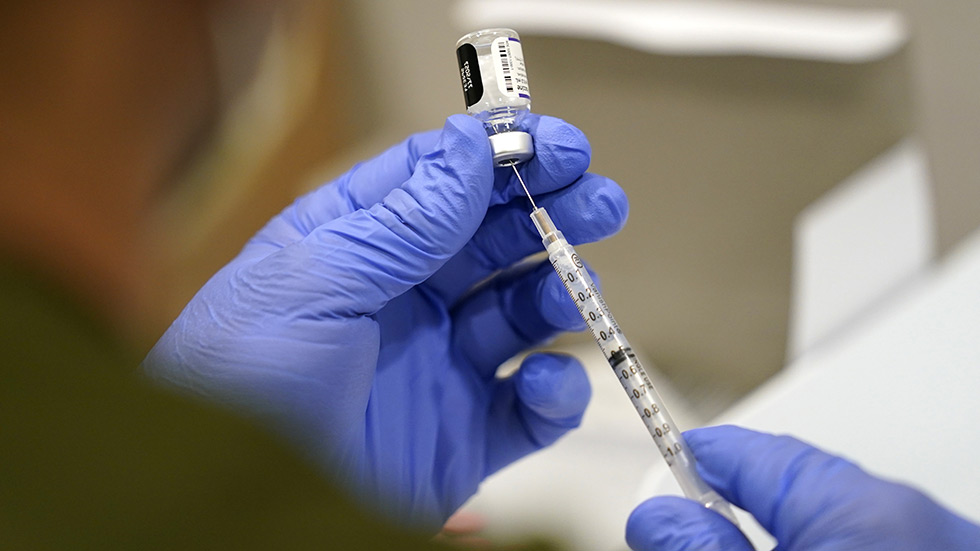Defense & National Security — Biden signs mammoth defense bill
It’s Monday, welcome to Overnight Defense & National Security, your nightly guide to the latest developments at the Pentagon, on Capitol Hill and beyond. Subscribe here: digital-staging.thehill.com/newsletter-signup.
President Biden signed the National Defense Authorization Act (NDAA) on Monday, setting up toplines and policy for the Department of Defense.
More on that, plus details on a COVID-19 outbreak on the USS Milwaukee and the death of Richard Marcinko, the founding commander of U.S. Navy SEAL Team 6.
For The Hill, I’m Jordan Williams. Write to me with tips jwilliams@digital-staging.thehill.com
Let’s get to it.
Biden signs $768B defense bill

President Biden signed the 2022 National Defense Authorization Act (NDAA) on Monday, setting up toplines and policy for the Pentagon.
The House passed the bill by an overwhelmingly bipartisan 363-70 vote in early December, and the Senate later passed the bill by a bipartisan 88-11 vote.
In a statement, Biden said the bill “provides vital benefits and enhances access to justice for military personnel and their families, and includes critical authorities to support our country’s national defense.”
The next battle: The NDAA is a policy bill and doesn’t authorize any actual spending. Therefore, Congress needs to pass an appropriations bill to fund the Department of Defense.
Congress passed a continuing resolution earlier this month, which funds the government through Feb. 18.
Defense Secretary Lloyd Austin said earlier this month that passing a full-year continuing resolution, as opposed to a full-year appropriations bill, would be “an unprecedented move that would cause enormous, if not irreparable, damage for a wide range of bipartisan priorities.”
Sen. Patrick Leahy (D-Vt.), chair of the Senate Appropriations Committee, has warned that a full-year continuing resolution would put defense spending at $35 billion less than what the NDAA provides for.
“We can all stand up here on the Senate floor and back at home, declaring our unwavering support for our troops and their families, and claiming to support a strong national defense, but until we put our money where our mouth is and provide the funding we say we support, those words ring hollow,” Leahy said in a statement.
What’s in the bill?: The NDAA provides $740 billion for the Department of Defense, which is $25 billion more than what the president requested for the agency for fiscal year 2022. It also includes $27.8 billion for defense-related activities in the Department of Energy and another $378 million for other defense-related activities.
Biden pointed to several provisions in the bill that he was against. Among them, he urged Congress to eliminate provisions that restrict the use of funds to transfer detainees at Guantanamo Bay
He also opposed provisions that require sharing with Congress information regarding the U.S. withdrawal from Afghanistan and the threat of Iranian-backed militias to U.S. personnel in Iraq and the Middle East.
The measures would include “highly sensitive classified information,” Biden said, that “could reveal critical intelligence sources or military operational plans.”
FOUNDING SEAL TEAM 6 COMMANDER DIES
Richard Marcinko, founding commander of U.S. Navy SEAL Team 6, died on Saturday at the age of 81, his son announced on Sunday.
“Last night, Christmas evening, we lost a hero, who’s also known as The Rogue Warrior, the retired Navy SEAL commander AND the creator of SEAL Team Six, my father, Richard Marcinko,” his son Matt Marcinko tweeted.
“His legacy will live forever. The man has died a true legend. Rest In Peace Dad. I love you forever,” he continued.
Matt Marcinko told The New York Times that the cause of father’s death was believed to be a heart attack.
SEAL TEAM 6: During the Iran hostage crisis in 1979, Marcinko was one of two Navy representatives on a Joint Chiefs of Staff task force known as the Terrorist Action Team (TAT), which was tasked with developing a plan to free American hostages. That team’s work culminated in Operation Eagle Claw in 1980, the failed attempt to rescue the hostages from the U.S. embassy in Tehran.
After that mission, Marcinko was asked to develop a team that would specialize in countering terrorist threats.
The Navy only had two SEAL Teams at the time, but Marcinko named the team “SEAL TEAM 6” to fool other nations into believing that the U.S. had at least three other such teams that were unknown.
He gathered the team’s members from several existing SEAL teams and Underwater Demolition teams.
Marcinko commanded the team from August 1980 to July 1983, the Navy SEAL museum noted, but SEAL Team 6 went on to become the Navy’s premier counter terrorist and hostage rescue unit.
The team’s most high-profile mission was the raid that killed Osama Bin Laden in 2011. The operation was later adapted into books and movies.
Navy offers boosters to USS Milwaukee crew

The Navy is offering booster doses of COVID-19 vaccines to sailors on the ship stalled by a coronavirus outbreak.
Dawn Grimes, a spokesperson for U.S. Naval Hospital at Guantánamo Bay, told The Hill it is responding to a request from the USS Milwaukee to provide booster doses, which will be administered by the ship’s medical crew to crew members who want one.
Cmdr. Kate Meadows, a spokesperson for U.S. Naval Forces Southern Command, told The Hill in a statement that booster doses would not be mandatory.
“The Milwaukee has been coordinating with naval station hospital personnel on when boosters could be administered to the Sailors, to those personnel who are interested in receiving one,” Meadows said. “While we recommend boosters, they are not mandatory for the crew.”
Meadows added that no booster doses have been administered.
A COVID-19 outbreak: The Milwaukee departed from Mayport, Fla., on Dec. 14 for its regularly scheduled deployment to the U.S. 4th Fleet region.
But last Friday, the Navy said the vessel was staying in port at Naval Station Guantánamo Bay after some sailors tested positive. The ship was at Guantánamo for a scheduled port visit.
The Navy said at the time that the ship’s crew was “100% immunized,” and those who tested positive for COVID-19 had been placed in quarantine. A portion of the infected sailors exhibited mild symptoms.
Grimes told The Hill that none of the sailors who tested positive for COVID-19 have required hospitalization.
Thousands of Russian troops withdraw from Ukraine

Thousands of Russian troops are withdrawing from the Ukrainian border after conducting drills for about a month, Reuters reported citing the Interfax news agency.
“A stage of combat coordination of divisions, combat crews, squads at motorized units… has been completed. More than 10,000 military servicemen… will march to their permanent deployment from the territory of the combined arms’ area of drills,” the Russian army is quoted as saying in the Interfax report, according to Reuters.
Russia had amassed tens of thousands of troops in regions north, east and south of Ukraine, which alarmed Kyiv and Western nations that Moscow may be planning an attack.
U.S. intelligence earlier this year revealed that Russia was planning a military offensive against Ukraine as early as next year that would involve the deployment of 175,000 troops near the border.
Lawmakers huddle with Ukraine’s president: In related news, more than 20 lawmakers held a video call on Friday with Ukrainian President Volodymyr Zelensky amid growing tensinos between Moscow and Kyiv.
Sen. Rob Portman (R-Ohio), the co-chairman of the Senate Ukraine Caucus who was on the call with Zelensky, said in a statement that the conversation touched on Russia’s threat to its borders, Zelensky’s appreciation for the U.S. military’s help and his opposition to the Nord Stream 2 pipeline, among other issues.
Zelensky, in a statement after the meeting concluded, said he briefed the U.S. delegation — made up of both senators and representatives — on steps being pursued to attain peace within existing negotiation formats.
They also reportedly discussed the importance of U.S. involvement in the peace process, expanding sanctions pressure on the Russian Federation, and cooperation between the U.S. and Ukraine in the security field.
WHAT WE’RE READING
- Japan to boost military spending amid East Asian threats
- Putin to ponder options if West fails to meet demands regarding Ukraine
- The Hill Opinion: Our ‘cold war’ frame distorts more than just our view of China
- The Hill Opinion: The US military’s extremism problem isn’t going away
- The Hill Opinion: We need scientific analysis of satellite data on UAP
That’s it for today. Check out The Hill’s defense and national security pages for the latest coverage. See you Tuesday.
Copyright 2024 Nexstar Media Inc. All rights reserved. This material may not be published, broadcast, rewritten, or redistributed..













